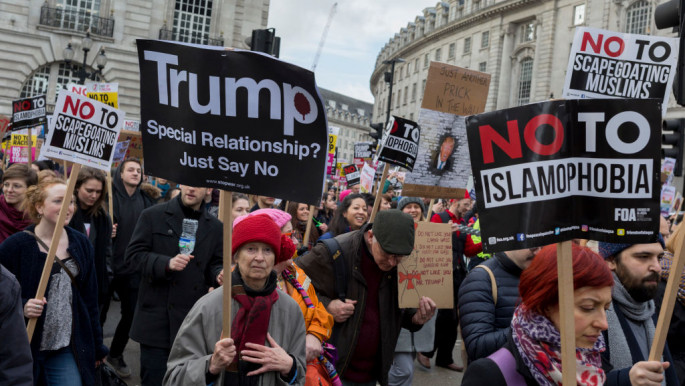
I have a message for Theresa May this Ramadan
Another likely occurrence in the run up to the "month of mercy" as it is often described, is an official statement or video message from Theresa May and her government wishing Muslims a blessed Ramadan.
Should the PM decide on such a gesture towards a community she has personally targeted throughout her political career, her message will be empty at best, and downright patronising at worst.
The Tories track record on Islamophobic policies which are presented in the form of securitisation projects, aren't even the sole reason that this year in particular, any "reaching out" to Muslims via speeches or annual Eid-el-Fitr celebrations by Number 10, will be offensive.
Among other things, May is expecting to host the return of US President Donald Trump before the end of the fasting period.
The man who has relentlessly and unapologetically waged war on Muslims throughout his short but turbulent political career, literally banning them from the US, will have the red carpet rolled out for him by our leaders, who via social media platforms are likely to express to the community wishes of prosperity during our most sacred month.
 |
So here, as a response to May's coming Ramadan message, is a pre-emptive 'no thank you' |  |
Muslims across the country, who know all too well that the "special relationship" between the US and UK overrides their right to equality and freedom, are already organising against Trump's presence.
In full spirit of the month, which serves as a time of reflection and realignment with the duty to serve God and remembrance of the commandment of fighting oppression and injustice wherever it manifests, thousands are expected to join demonstrations taking place on 3 June.
Maz Saleem, who has been a key organiser in anti-Trump efforts across the UK, reinforces that "Muslims will be among the most vocal campaigners and organisers when Trump returns to the UK."
 |
|
| Last time Trump's visit was on the cards, protesters came out against the US president's Islamophobic policies, and May's plans to receive him [Getty] |
Saleem states that the mobilisations will see Muslims "working across communities, trade unions, organisations and faiths in order to reinforce that Trump's bigotry and hate are not welcome here."
Discussing May and her government's message, the activist isn't expecting any solidarity from the government, "I doubt many others will, but we will have [solidarity] from the millions of people across the country who are going to join us on the streets to oppose his visit, and most importantly his ideologies. During a time of rising Islamophobia, now more than ever Muslims need to rise up, take action and put our teachings into practice."
 |
During a time of rising Islamophobia, now more than ever Muslims need to rise up, take action and put our teachings into practice - Maz Saleem |  |
A continued driving force in anti-racist mobilisations within the Muslim community, is the collective trauma sustained during Ramadan 2017, when Finsbury Mosque worshipers were attacked. Far-right inspired Darren Osborne drove into crowds of prayer-goers during the end of the night prayers (taraweeh), stating later that he wanted to "kill all Muslims". The events lead to the death of Makram Ali, while others were injured.
Rising anti-Muslim racism doesn't take place in a vacuum, and Muslims' fears over their safety during and outside of the holy month are legitimate when you consider just how complicit the British government is in their continued oppression.
Read more: It's high time our governments stopped normalising racism
The recent emails leaked to Buzzfeed in which Tory chairman Brandon Lewis informed Conservative Party members who were suspended over racist and Islamophobic incidents, that they would be reinstated, is but one example.
Lewis has been accused of ignoring complaints of Islamophobia and this scandal has only further demonstrated that the Party doesn't take their supposed zero tolerance approach seriously.
They seem to think a diversity test, remaining silent over the suspension and deleting past hate-filled social media posts will suffice in appeasing those impacted, and somehow solves the issue of their institutional racism (not that they have acknowledged it exists, of course).
The entire affair is made worse by the fact that Lewis had previously criticised the Labour party for reinstating members who had been accused of anti-Semitism.
 |
The prime minister can keep her wishes, her policies, and her governmental plans |  |
Yet the relentless war on Muslims under the cover of a so-called War on Terror, not to mention the never-ending assaults on migrants, black communities, and the poor, will still not be enough for some among our own community.
We are still likely to be told to recognise supposed positive developments, and work with those in power to better the situation. The lack of any evidence of this strategy working over the last two decades will not deter many of our official "leaders" and "spokespeople".
So here, as a response to May's coming message, is a pre-emptive "no thank you". The prime minister can keep her wishes, her policies, and her governmental plans. All I want for Ramadan, is mass mobilisations against racism and her resignation.
Malia Bouattia is an activist, a former president of the National Union of Students, and co-founder of the Students not Suspects/Educators not Informants Network.
Follow her on Twitter: @MaliaBouattia
Opinions expressed in this article remain those of the author and do not necessarily represent those of The New Arab, its editorial board or staff.




